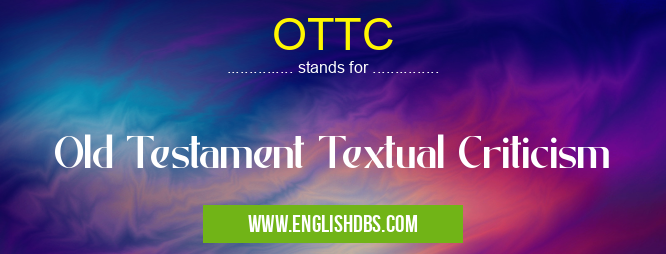What does OTTC mean in BIBLE
Old Testament Textual Criticism (OTTC) is a critical examination of the Bible's Old Testament, focusing on uncovering and understanding its textual origins, history and development. It involves examining manuscripts — the handwritten documents that contain the biblical text — as well as other ancient evidence such as ancient translations, commentaries and quotations from early authors. OTTC seeks to answer questions about which biblical texts are original and accurate, which have been corrupted or changed over time, and how we should interpret them in today's contexts.

OTTC meaning in Bible in Community
OTTC mostly used in an acronym Bible in Category Community that means Old Testament Textual Criticism
Shorthand: OTTC,
Full Form: Old Testament Textual Criticism
For more information of "Old Testament Textual Criticism", see the section below.
Essential Questions and Answers on Old Testament Textual Criticism in "COMMUNITY»BIBLE"
What is Old Testament Textual Criticism?
Old Testament Textual Criticism is an area of biblical scholarship focused on the study and comparison of Jewish manuscripts to identify the original text of the Hebrew Bible. It involves both written and archaeological evidence in order to assess the reliability of the biblical texts. The aim is to accurately reconstruct, as far as possible, what was originally written in each book of the Bible.
Why should OTTC be studied?
OTTC provides a basis for furthering our understanding and knowledge of the origin and development of the ancient Near Eastern cultures, particularly those that provided a foundation for later Judaism and Christianity. The resulting insights can then be used to interpret religious texts more accurately. Furthermore, OTTC is an essential tool for verifying whether various translations accurately represent the original texts or contain errors or bias.
What kind of evidence is used when studying OTTC?
Evidence used when studying OTTC includes archaeological finds such as inscriptions from ancient Near Eastern civilizations; manuscripts from ancient libraries located in Jerusalem, Alexandria, etc; quotations from ancient authors who refer to Biblical texts; linguistic studies; codicology, which looks at ancient writing materials or writing styles; paleography, which looks at handwriting styles; textual analysis of manuscripts using special tools and techniques; literary studies examining style, structure and genre; and historical-critical approaches that examine religious traditions through careful examination of primary sources.
How does textual similarity express itself in OTTC?
Textual similarity expresses itself in OTTC through what are known as "text types", which refer to different versions or recensions (i.e., editions) of a given text that share certain features with one another but may differ significantly in other aspects. These text types are often named after a location associated with their origin (e.g., Masoretic Text type), person associated with them (e.g., Ben Chayim's Text type), language they use (e.g., Septuagint Greek Text type), or based on their source material (e.g., Qumran Texts).
What scholarly methodologies are applied in OTTC?
Scholarly methodologies used in OTTC include close reading of biblical manuscripts through careful attention to syntax and grammar, philology looking at changes across multiple textual witnesses over time, stemmatics - tracing relationships between manuscript variations over time -, form criticism examining underlying cultural patterns embedded within language usage across different texts, redaction criticism focusing on editorial decisions determining how earlier sources have been combined into a single composition by subsequent redactors/editors along with new material added by them, canonical criticism reflecting upon theological assumptions present within individual books that have shaped its content along with socio-cultural context influencing its development throughout history over time amongst other things.
What sort of problems arise when studying OTTC?
Problems that arise when studying OTTC include dealing with discrepancies between textual witnesses depending on whether they are consonantal (Hebrew) or vocalized (Massoretic); having incomplete extant manuscript evidence due to fragmentary nature making it difficult sometimes to reconstruct original wording precisely; accounting for variant readings due to scribal errors arising out recension process during transmission process; sometimes textual context can be unclear providing difficulties when trying to pinpoint exact meaning or intent behind certain verses
Final Words:
Ultimately OTTC helps us to find an appropriate interpretation of Scripture so that we can learn from its timeless truths today. By carefully exploring the historical context surrounding these books of the Bible our understanding can be strengthened with greater clarity and accuracy — enabling us to apply those same truths in our lives today. Therefore, OTTC is a valuable tool in our pursuit to understand God's Word in its original form.
